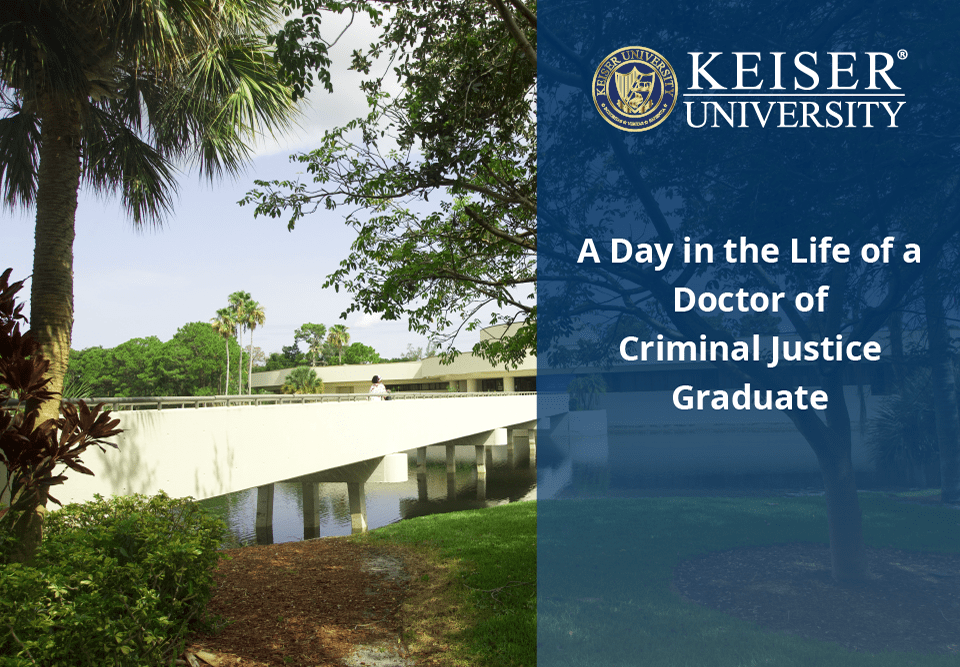Thinking about advancing your education with a doctorate of criminal justice degree (DCJ)? You likely have some questions about what it is like to be a doctorate student in this field — as well as what to expect from doctoral student life.
While no two doctorate students will share the same experience, there are some general expectations you can have for a criminal justice program in terms of daily routine, tools used and challenges faced.
What Is a Criminal Justice Doctoral Program?
In simplest terms, a criminal justice doctoral program is a terminal degree program that covers in-depth and advanced topics in criminal justice research and theory.
Overview of the Degree
DCJ programs may differ in terms of curriculum and courses offered. However, coursework in this type of program typically covers topics such as:
- Quantitative and qualitative research methods
- Data analysis
- Policy and practice
- Theoretical frameworks of criminology and the criminal justice system
- Specialized areas of the field (like juvenile justice or corrections)
Common Career Goals
Those pursuing a DCJ may wish to explore criminal justice careers in academia, including teaching roles with major colleges or universities. Others may be looking to make a difference in the field by contributing their own unique research. For some, a DCJ can open the doors of opportunity for advanced leadership roles within police departments or government agencies.
A Day in the Life of a Doctoral Student of Criminal Justice
Of course, your day as a criminal justice student will not always follow this precise structure but below is an idea of what you may be able to expect from the experience.
Morning: Coursework and Reading
The beginning of the day is an ideal time to make sure you are caught up on any assigned coursework and reading. The topics covered in your assigned readings will be integral to applying what you have learned in real-world scenarios, at work or otherwise.
Midday: Research and Data Analysis
Many DCJ students also spend a good chunk of the day conducting research for their dissertations or for other research assignments. During this time, they may run data through visualization and analysis software to gain better insights into what it means and how it applies to what they are learning about in their programs.
Afternoon: Teaching, Work or Practicum Hours
For students who have practicum or assistant teaching roles, afternoons may be spent gaining hands-on experience. Other students may continue working part- or full-time during the afternoons.
Evening: Writing and Professional Development
As the day winds down, DCJ students may choose to chip away at writing assignments or work on their dissertations, if applicable. This can also be an optimal opportunity to strategize for the future through professional development activities: for instance, working on tasks related to job hunting and networking or attending a virtual workshop or webinar.
Key Skills and Tools Used Daily
During a day in the life of a DCJ program, you can expect to regularly draw from tools and skill sets.
Analytical and Research Skills
Much of your coursework in a DCJ program is likely to have a research and/or analytical component, requiring you to think critically and draw your own conclusions based on independent research and evaluation.
Communication and Writing Proficiency
The DCJ program aims to sharpen students’ writing and communication skills, too, both of which are critical in many advanced criminal justice roles. In addition to report writing skills, students may work on improving their research writing and verbal/written communication.
Tools: SPSS, NVivo, LexisNexis, etc.
DCJ students should also familiarize themselves with some commonly used tools in the field, including:
- SPSS – Social sciences software that can be useful in visualizing trends and relationships between data.
- NVivo – A qualitative data analysis and visualization tool.
- LexisNexis – A database suite that criminal justice professionals can use for investigative and analytical purposes, including extensive public and non-public records.
Challenges and How Students Overcome Them
Now that you have better insight into what a day in the life of a doctoral student may look like, you might wonder what kinds of challenges you can anticipate as a doctoral student — and how to overcome them.
Balancing Work, Study and Personal Life
Students in a DCJ program are often trying to juggle the demands of their professional, personal and academic lives, which can present inherent obstacles. This is where having strong time management skills and self-discipline can make all the difference in helping students balance their responsibilities during this busy season of life.
Navigating Complex Legal and Policy Topics
As terminal degrees, doctoral degree programs are rigorous — diving into advanced and complex topics that may not have been covered in a master’s degree program. This might include complicated legal and policy topics that require strong reading comprehension skills to understand. By following assigned readings diligently and attending professors’ office hours (including virtual office hours), students can stay on top of complex topics and get additional support when needed.
Staying Motivated Through Dissertation Writing
Many DCJ programs require students to complete a dissertation, which typically accounts for eight credit hours (or two classes). These projects demand a great deal of time and research to complete successfully. Students may experience burnout or a lack of motivation at some point during the process, so setting deadlines for oneself and breaking the larger project up into more manageable parts is key.
Advice for Future Criminal Justice Doctoral Students
Wondering if you have what it takes to tackle a DCJ program? With the right preparation and tips in mind, you can maximize your chances of success.
Choose a Research Focus Early
Part of your graduation requirements will be to complete a dissertation with a (faculty-approved) topic of your own choosing. Rather than waiting until the last minute to start thinking about your dissertation, consider selecting a topic to focus on early in your doctorate program; this way, you can start brainstorming ideas and making connections between your topic and assigned readings sooner.
Network With Peers and Faculty
To get the most out of your graduate student experience, use it as an opportunity not just to earn your degree — but to expand your professional network as well. Take time to connect with peers and faculty in the field, whether it’s online or by attending in-person networking events. You never know where those connections could lead you down the road.
Embrace Flexibility and Time Management
Solid time management skills can take you far in a doctorate degree program, especially if you are able to prioritize the tasks that are most important. At the same time, because you cannot always plan for every possible roadblock, maintaining a sense of flexibility will help you stay adaptable in changing circumstances.
Explore Keiser University’s Doctoral Programs in Criminal Justice
Keiser University is proud to offer a 100% online Doctor of Criminal Justice degree program that is specifically designed with the demands of busy, working professionals at the forefront.
Overview of the Online Doctorate in Criminal Justice
Our DCJ program consists of 44 credit hours or 16 courses broken up into eight-week terms. Depending on whether you enroll part or full time (and accounting for any transfer credit you may have), most students can expect to complete the program in about 20 to 32 months.
Curriculum Highlights and Faculty Expertise
Students in Keiser University’s DCJ program can expect to explore coursework in relevant topics like:
- Criminological theory
- Police and society
- Crime and punishment
- Advanced research design
- Qualitative and quantitative research
As part of this program, students are also required to complete an applied doctorate project that empowers them to demonstrate real-world application of their knowledge and research abilities.
Throughout the program, students can expect dedicated guidance and support from world-class faculty who have worked in advanced criminal justice roles themselves and are thus qualified to bring their real-world experience to the table.
Flexible Format for Working Professionals
Juggling the demands of a doctorate-level degree program while also working and taking care of other responsibilities can be challenging — but Keiser’s convenient online format offers much-needed flexibility and convenience for working professionals. Specifically, this format allows busy students to complete coursework on their own time and learn at their own pace.
Common Questions About Criminal Justice Doctoral Students
Discover quick answers to some of the most frequently asked questions about the doctorate in criminal justice experience below.
What does a criminal justice doctoral student do daily?
The daily routine of a criminal justice doctoral student can vary depending on whether the student is working part or full-time, attending classes on campus/online, or fulfilling other responsibilities. In general, though, students’ days consist of a balance of work and academics, with common school responsibilities ranging from assigned coursework/reading to researching or completing practicum hours.
Can you work full time while pursuing a doctorate in criminal justice?
Yes, with the right degree program and time management skills, you could still work a full-time job. Ideally, if you plan to do so while completing your doctorate degree, you should seek a program that is available in a flexible online format for added versatility and convenience. That way, you can more or less work at your own pace without putting your professional life on hold.
What careers require a criminal justice doctorate?
Many advanced roles in criminal justice require (or benefit significantly) a doctorate-level education. No matter if you aspire to teach criminal justice courses as a professor or work your way into a policy analysis or leadership role, having a DCJ can set you apart while preparing you for the challenges and opportunities of advanced work in the field.
Still Interested in a DCJ?
Earning a terminal degree in criminal justice is an achievement that calls for commitment and dedication to your goals. However, once you have your degree, you will have built the specialized skills and knowledge that you could leverage to pursue advanced opportunities in law enforcement, policing, corrections, juvenile justice, emergency management or various other areas of the field.
Still looking for the DCJ program that is right for you? Keiser University’s Doctor of Criminal Justice (DCJ) program is offered in a convenient online format and can be completed in just 20 to 32 months. Get in touch to learn more about what sets our DCJ program apart or get started with your online application now.
Sources
https://www.keiseruniversity.edu/doctor-of-criminal-justice-dcj/
https://www.keiseruniversity.edu/career-opportunities-dcj/
https://www.keiseruniversity.edu/accredited-criminal-justice-degree-programs/
https://www.keiseronline.com/criminal-justice-degrees/
https://www.keiseruniversity.edu/accredited-criminal-justice-degree-programs/
https://www.keiseruniversity.edu/graduate-school/admissions/faculty/
https://www.keiseruniversity.edu/whats-the-difference-between-a-dcj-and-a-phd-in-criminal-justice/
https://pmc.ncbi.nlm.nih.gov/articles/PMC11967054/






 The instructors at Keiser University impacted my life. They believed in my ability to become a great graphic designer, regardless of how I felt about my skills. KU helped to prepare me for the real world and got me to where I am today.
The instructors at Keiser University impacted my life. They believed in my ability to become a great graphic designer, regardless of how I felt about my skills. KU helped to prepare me for the real world and got me to where I am today.
